Psychology Personal Reflection: Career Goals, Skills, and Approaches
VerifiedAdded on 2020/05/04
|5
|1092
|155
Homework Assignment
AI Summary
This assignment is a personal reflection by a psychology student on their career aspirations. The student discusses their interest in psychology, particularly focusing on providing guidance to individuals dealing with stress and mental health issues. The reflection highlights the student's preferred therapeutic approaches, including Psychodynamic and Person-Centred Humanistic approaches, and their experiences working with underprivileged children. The student identifies interpersonal skills, observational skills, and emotional stability as personal aptitudes, along with transferable skills like communication, goal setting, and understanding of psychological concepts. Based on these assessments, the student considers a career as a psychotherapist, emphasizing the application of various therapeutic techniques to assist individuals in managing emotional and psychological challenges. The reflection concludes with a list of relevant references supporting the student's insights and perspectives.
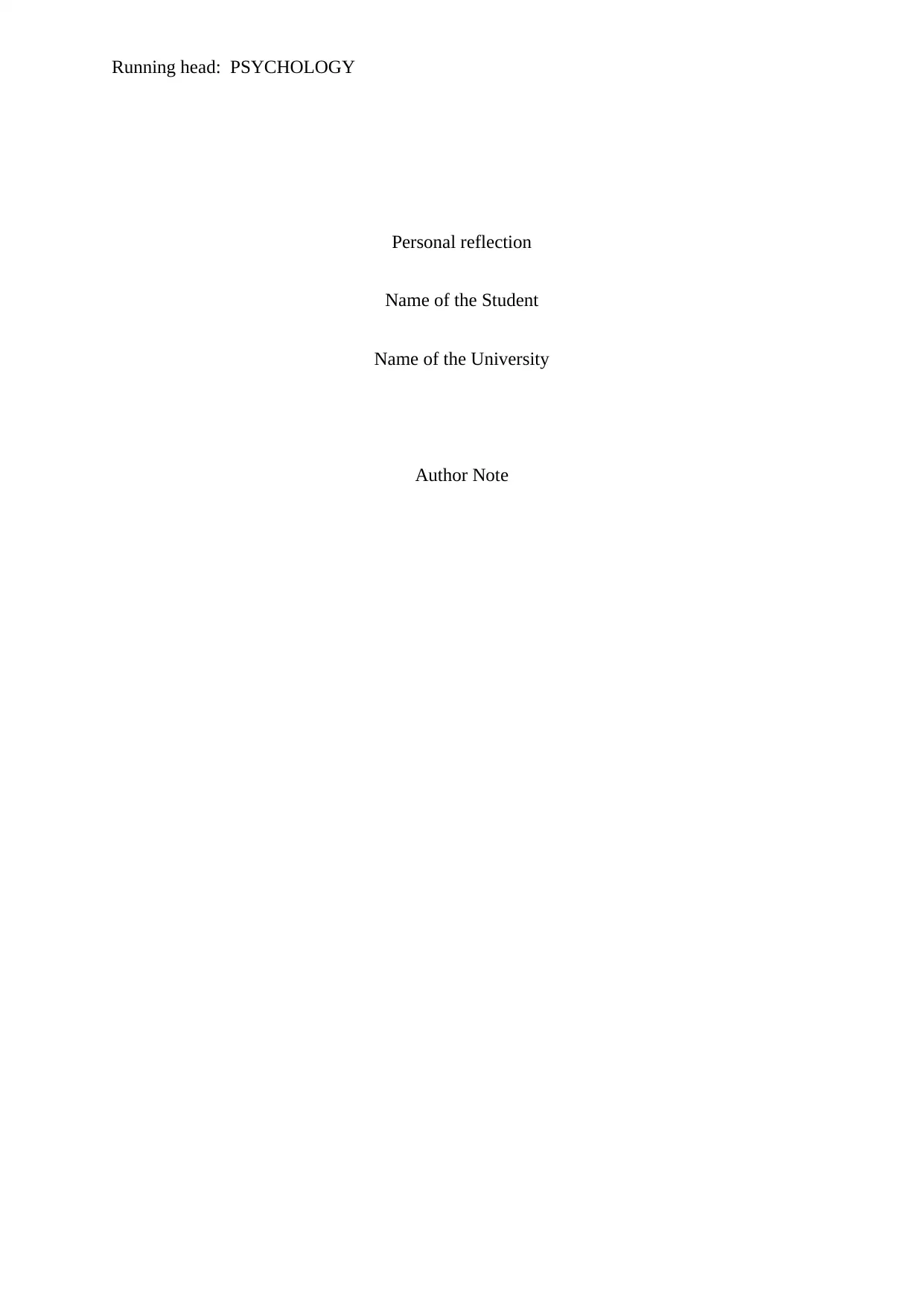
Running head: PSYCHOLOGY
Personal reflection
Name of the Student
Name of the University
Author Note
Personal reflection
Name of the Student
Name of the University
Author Note
Paraphrase This Document
Need a fresh take? Get an instant paraphrase of this document with our AI Paraphraser
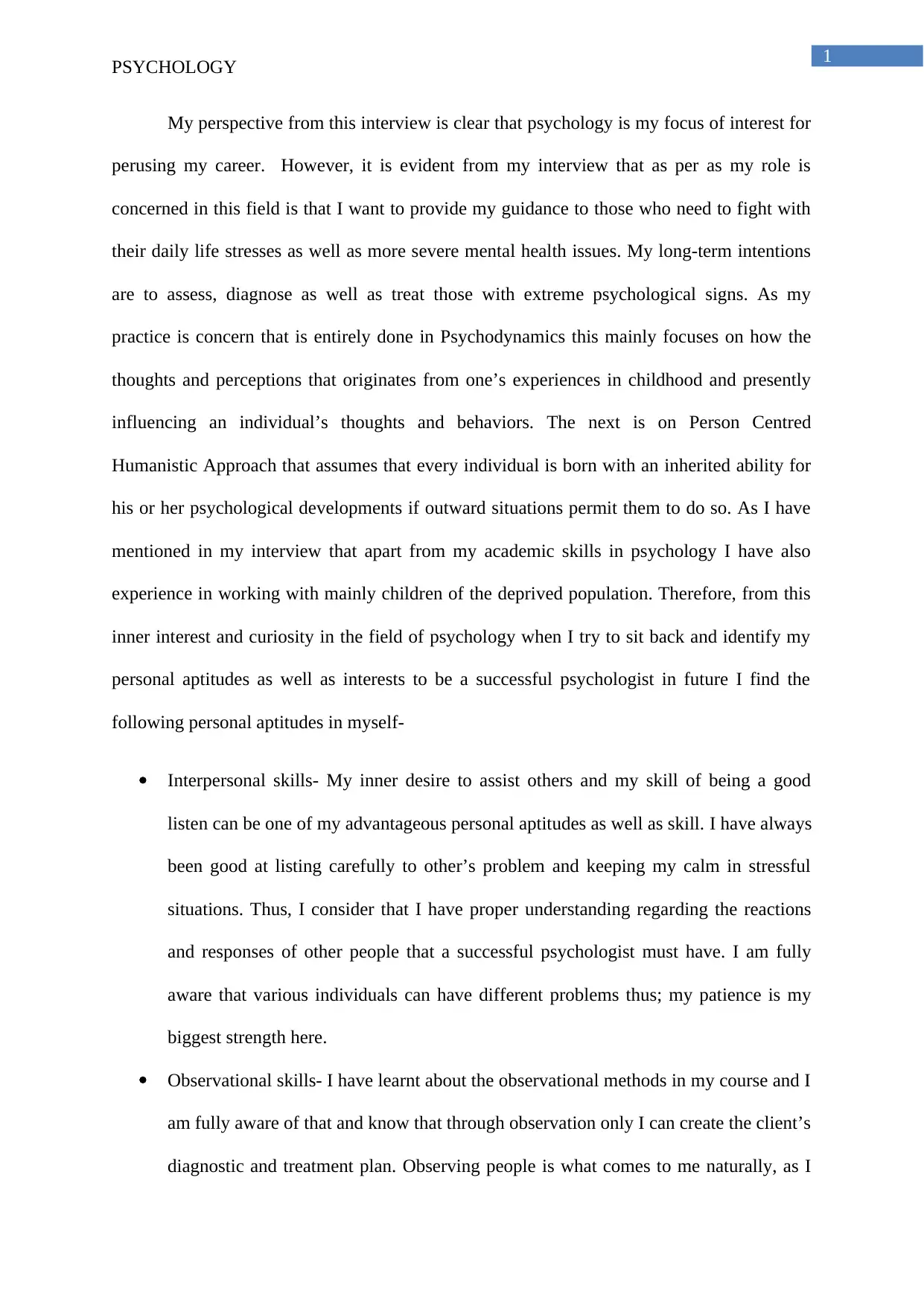
1
PSYCHOLOGY
My perspective from this interview is clear that psychology is my focus of interest for
perusing my career. However, it is evident from my interview that as per as my role is
concerned in this field is that I want to provide my guidance to those who need to fight with
their daily life stresses as well as more severe mental health issues. My long-term intentions
are to assess, diagnose as well as treat those with extreme psychological signs. As my
practice is concern that is entirely done in Psychodynamics this mainly focuses on how the
thoughts and perceptions that originates from one’s experiences in childhood and presently
influencing an individual’s thoughts and behaviors. The next is on Person Centred
Humanistic Approach that assumes that every individual is born with an inherited ability for
his or her psychological developments if outward situations permit them to do so. As I have
mentioned in my interview that apart from my academic skills in psychology I have also
experience in working with mainly children of the deprived population. Therefore, from this
inner interest and curiosity in the field of psychology when I try to sit back and identify my
personal aptitudes as well as interests to be a successful psychologist in future I find the
following personal aptitudes in myself-
Interpersonal skills- My inner desire to assist others and my skill of being a good
listen can be one of my advantageous personal aptitudes as well as skill. I have always
been good at listing carefully to other’s problem and keeping my calm in stressful
situations. Thus, I consider that I have proper understanding regarding the reactions
and responses of other people that a successful psychologist must have. I am fully
aware that various individuals can have different problems thus; my patience is my
biggest strength here.
Observational skills- I have learnt about the observational methods in my course and I
am fully aware of that and know that through observation only I can create the client’s
diagnostic and treatment plan. Observing people is what comes to me naturally, as I
PSYCHOLOGY
My perspective from this interview is clear that psychology is my focus of interest for
perusing my career. However, it is evident from my interview that as per as my role is
concerned in this field is that I want to provide my guidance to those who need to fight with
their daily life stresses as well as more severe mental health issues. My long-term intentions
are to assess, diagnose as well as treat those with extreme psychological signs. As my
practice is concern that is entirely done in Psychodynamics this mainly focuses on how the
thoughts and perceptions that originates from one’s experiences in childhood and presently
influencing an individual’s thoughts and behaviors. The next is on Person Centred
Humanistic Approach that assumes that every individual is born with an inherited ability for
his or her psychological developments if outward situations permit them to do so. As I have
mentioned in my interview that apart from my academic skills in psychology I have also
experience in working with mainly children of the deprived population. Therefore, from this
inner interest and curiosity in the field of psychology when I try to sit back and identify my
personal aptitudes as well as interests to be a successful psychologist in future I find the
following personal aptitudes in myself-
Interpersonal skills- My inner desire to assist others and my skill of being a good
listen can be one of my advantageous personal aptitudes as well as skill. I have always
been good at listing carefully to other’s problem and keeping my calm in stressful
situations. Thus, I consider that I have proper understanding regarding the reactions
and responses of other people that a successful psychologist must have. I am fully
aware that various individuals can have different problems thus; my patience is my
biggest strength here.
Observational skills- I have learnt about the observational methods in my course and I
am fully aware of that and know that through observation only I can create the client’s
diagnostic and treatment plan. Observing people is what comes to me naturally, as I
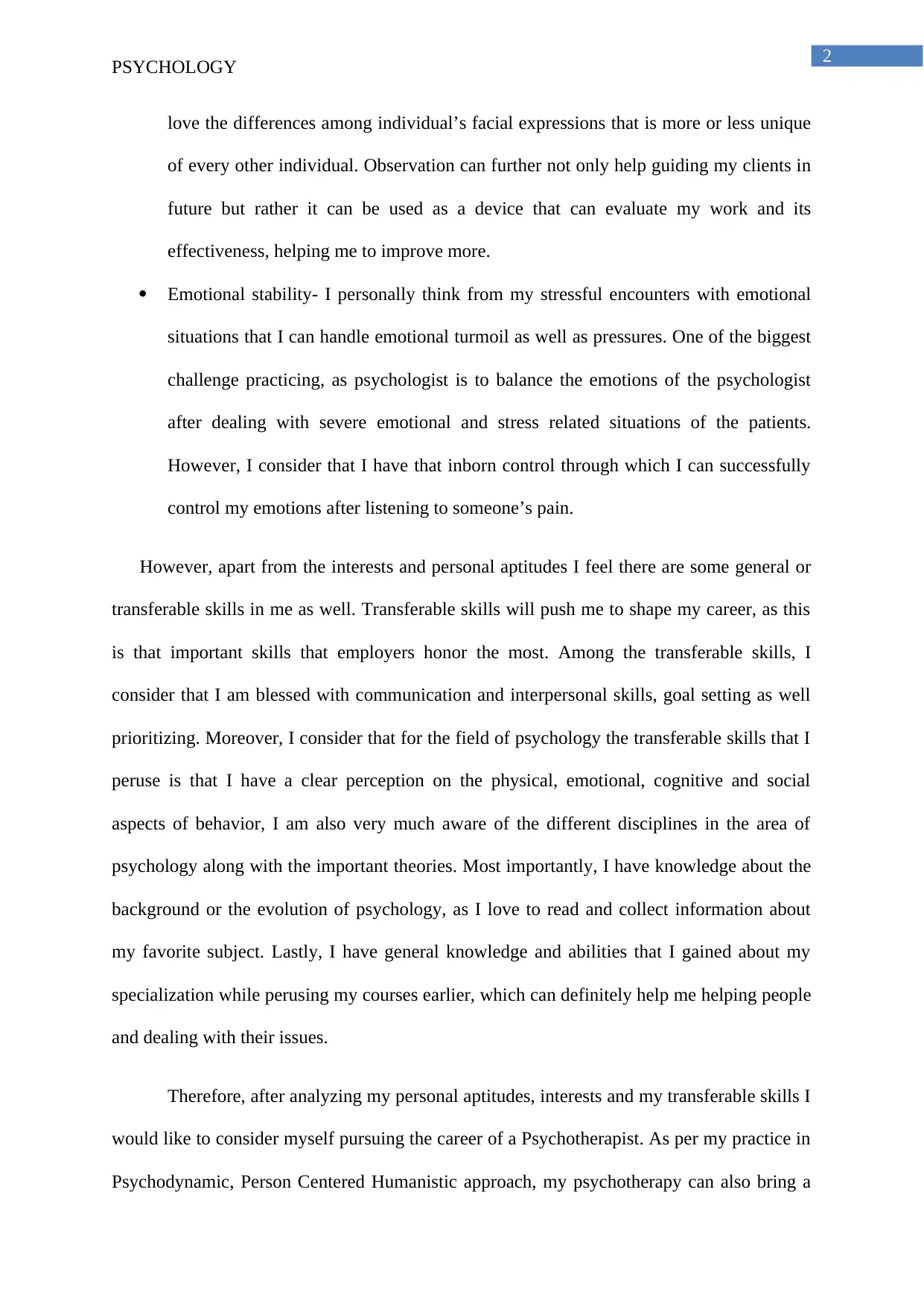
2
PSYCHOLOGY
love the differences among individual’s facial expressions that is more or less unique
of every other individual. Observation can further not only help guiding my clients in
future but rather it can be used as a device that can evaluate my work and its
effectiveness, helping me to improve more.
Emotional stability- I personally think from my stressful encounters with emotional
situations that I can handle emotional turmoil as well as pressures. One of the biggest
challenge practicing, as psychologist is to balance the emotions of the psychologist
after dealing with severe emotional and stress related situations of the patients.
However, I consider that I have that inborn control through which I can successfully
control my emotions after listening to someone’s pain.
However, apart from the interests and personal aptitudes I feel there are some general or
transferable skills in me as well. Transferable skills will push me to shape my career, as this
is that important skills that employers honor the most. Among the transferable skills, I
consider that I am blessed with communication and interpersonal skills, goal setting as well
prioritizing. Moreover, I consider that for the field of psychology the transferable skills that I
peruse is that I have a clear perception on the physical, emotional, cognitive and social
aspects of behavior, I am also very much aware of the different disciplines in the area of
psychology along with the important theories. Most importantly, I have knowledge about the
background or the evolution of psychology, as I love to read and collect information about
my favorite subject. Lastly, I have general knowledge and abilities that I gained about my
specialization while perusing my courses earlier, which can definitely help me helping people
and dealing with their issues.
Therefore, after analyzing my personal aptitudes, interests and my transferable skills I
would like to consider myself pursuing the career of a Psychotherapist. As per my practice in
Psychodynamic, Person Centered Humanistic approach, my psychotherapy can also bring a
PSYCHOLOGY
love the differences among individual’s facial expressions that is more or less unique
of every other individual. Observation can further not only help guiding my clients in
future but rather it can be used as a device that can evaluate my work and its
effectiveness, helping me to improve more.
Emotional stability- I personally think from my stressful encounters with emotional
situations that I can handle emotional turmoil as well as pressures. One of the biggest
challenge practicing, as psychologist is to balance the emotions of the psychologist
after dealing with severe emotional and stress related situations of the patients.
However, I consider that I have that inborn control through which I can successfully
control my emotions after listening to someone’s pain.
However, apart from the interests and personal aptitudes I feel there are some general or
transferable skills in me as well. Transferable skills will push me to shape my career, as this
is that important skills that employers honor the most. Among the transferable skills, I
consider that I am blessed with communication and interpersonal skills, goal setting as well
prioritizing. Moreover, I consider that for the field of psychology the transferable skills that I
peruse is that I have a clear perception on the physical, emotional, cognitive and social
aspects of behavior, I am also very much aware of the different disciplines in the area of
psychology along with the important theories. Most importantly, I have knowledge about the
background or the evolution of psychology, as I love to read and collect information about
my favorite subject. Lastly, I have general knowledge and abilities that I gained about my
specialization while perusing my courses earlier, which can definitely help me helping people
and dealing with their issues.
Therefore, after analyzing my personal aptitudes, interests and my transferable skills I
would like to consider myself pursuing the career of a Psychotherapist. As per my practice in
Psychodynamic, Person Centered Humanistic approach, my psychotherapy can also bring a
⊘ This is a preview!⊘
Do you want full access?
Subscribe today to unlock all pages.

Trusted by 1+ million students worldwide
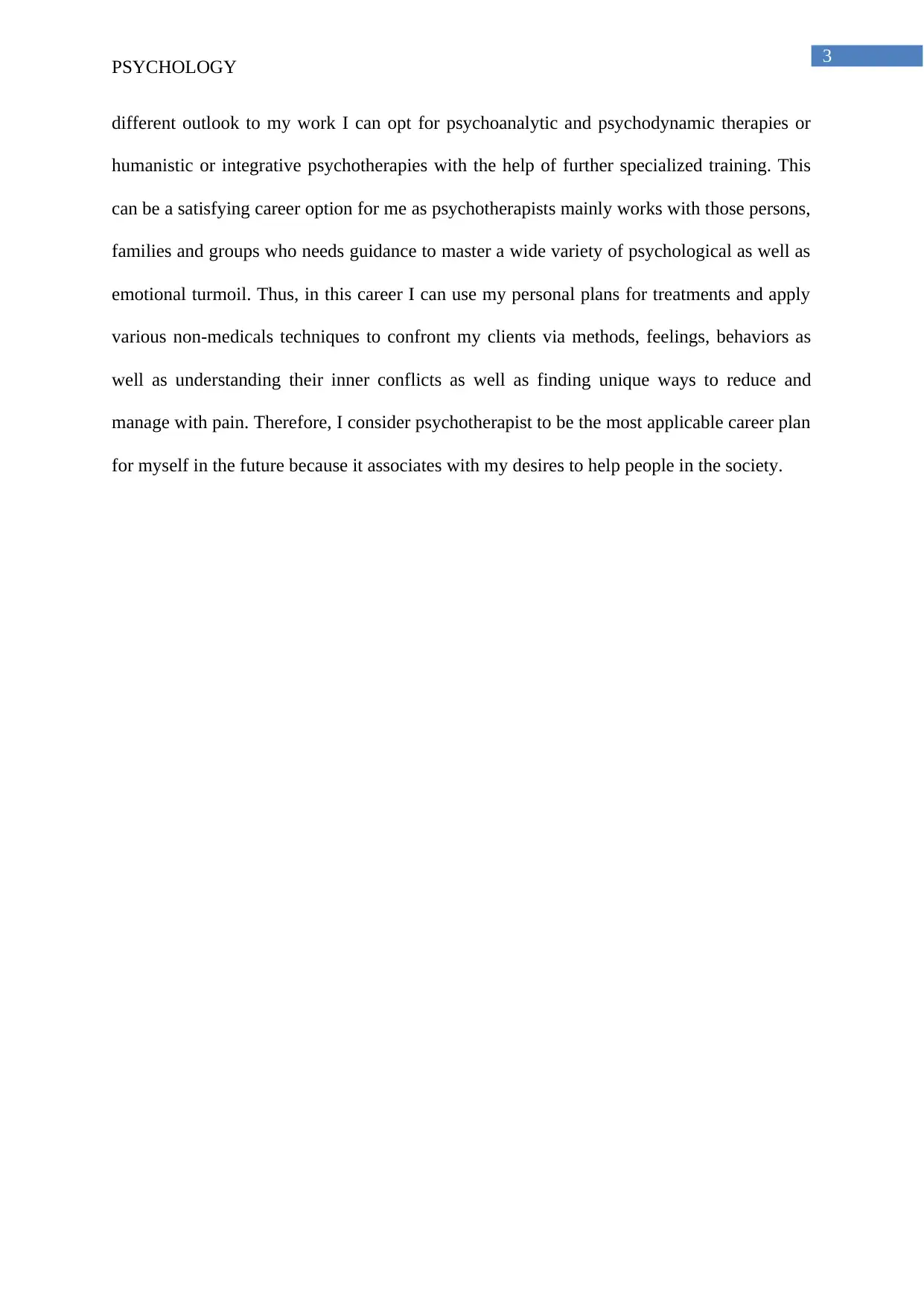
3
PSYCHOLOGY
different outlook to my work I can opt for psychoanalytic and psychodynamic therapies or
humanistic or integrative psychotherapies with the help of further specialized training. This
can be a satisfying career option for me as psychotherapists mainly works with those persons,
families and groups who needs guidance to master a wide variety of psychological as well as
emotional turmoil. Thus, in this career I can use my personal plans for treatments and apply
various non-medicals techniques to confront my clients via methods, feelings, behaviors as
well as understanding their inner conflicts as well as finding unique ways to reduce and
manage with pain. Therefore, I consider psychotherapist to be the most applicable career plan
for myself in the future because it associates with my desires to help people in the society.
PSYCHOLOGY
different outlook to my work I can opt for psychoanalytic and psychodynamic therapies or
humanistic or integrative psychotherapies with the help of further specialized training. This
can be a satisfying career option for me as psychotherapists mainly works with those persons,
families and groups who needs guidance to master a wide variety of psychological as well as
emotional turmoil. Thus, in this career I can use my personal plans for treatments and apply
various non-medicals techniques to confront my clients via methods, feelings, behaviors as
well as understanding their inner conflicts as well as finding unique ways to reduce and
manage with pain. Therefore, I consider psychotherapist to be the most applicable career plan
for myself in the future because it associates with my desires to help people in the society.
Paraphrase This Document
Need a fresh take? Get an instant paraphrase of this document with our AI Paraphraser
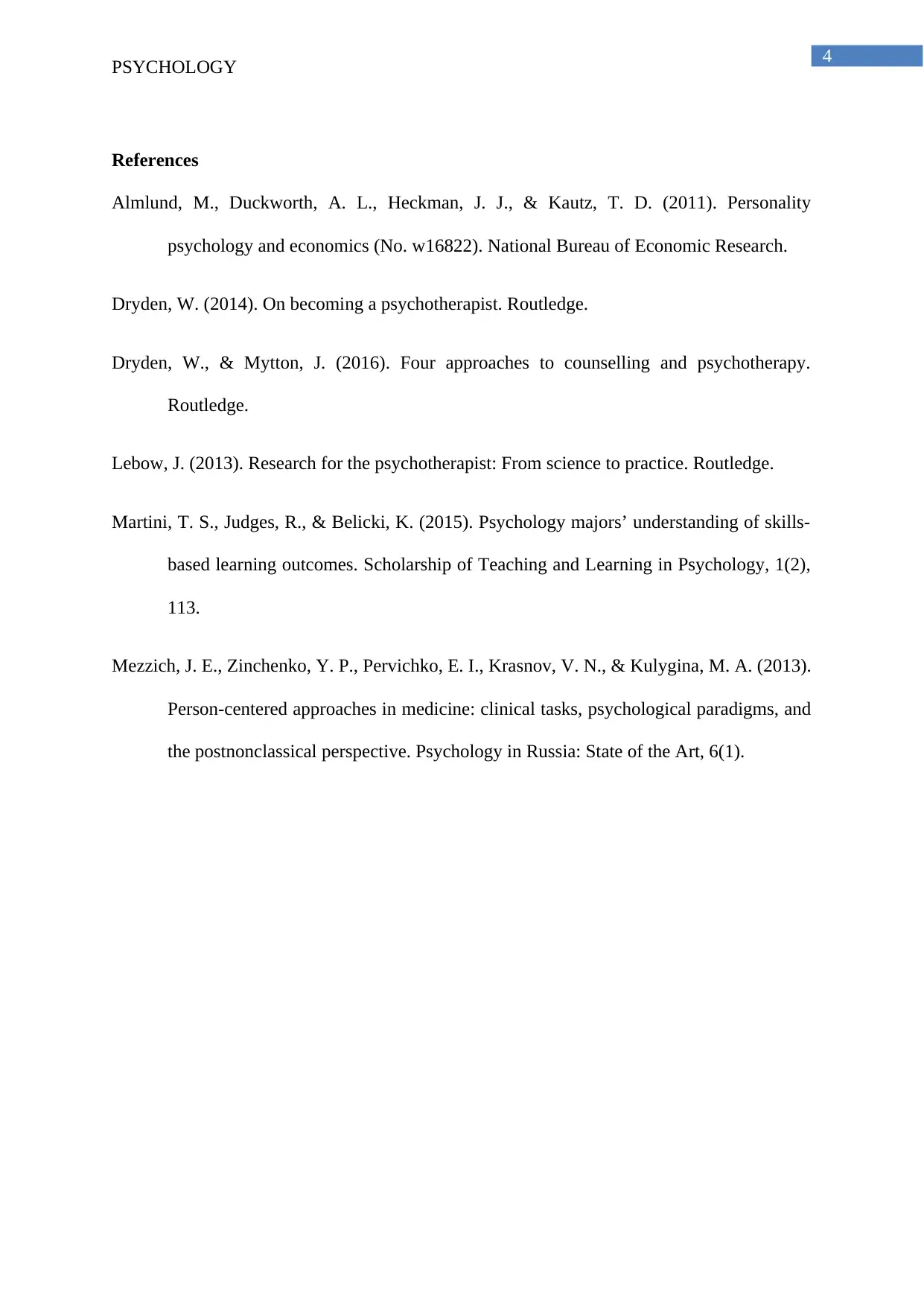
4
PSYCHOLOGY
References
Almlund, M., Duckworth, A. L., Heckman, J. J., & Kautz, T. D. (2011). Personality
psychology and economics (No. w16822). National Bureau of Economic Research.
Dryden, W. (2014). On becoming a psychotherapist. Routledge.
Dryden, W., & Mytton, J. (2016). Four approaches to counselling and psychotherapy.
Routledge.
Lebow, J. (2013). Research for the psychotherapist: From science to practice. Routledge.
Martini, T. S., Judges, R., & Belicki, K. (2015). Psychology majors’ understanding of skills-
based learning outcomes. Scholarship of Teaching and Learning in Psychology, 1(2),
113.
Mezzich, J. E., Zinchenko, Y. P., Pervichko, E. I., Krasnov, V. N., & Kulygina, M. A. (2013).
Person-centered approaches in medicine: clinical tasks, psychological paradigms, and
the postnonclassical perspective. Psychology in Russia: State of the Art, 6(1).
PSYCHOLOGY
References
Almlund, M., Duckworth, A. L., Heckman, J. J., & Kautz, T. D. (2011). Personality
psychology and economics (No. w16822). National Bureau of Economic Research.
Dryden, W. (2014). On becoming a psychotherapist. Routledge.
Dryden, W., & Mytton, J. (2016). Four approaches to counselling and psychotherapy.
Routledge.
Lebow, J. (2013). Research for the psychotherapist: From science to practice. Routledge.
Martini, T. S., Judges, R., & Belicki, K. (2015). Psychology majors’ understanding of skills-
based learning outcomes. Scholarship of Teaching and Learning in Psychology, 1(2),
113.
Mezzich, J. E., Zinchenko, Y. P., Pervichko, E. I., Krasnov, V. N., & Kulygina, M. A. (2013).
Person-centered approaches in medicine: clinical tasks, psychological paradigms, and
the postnonclassical perspective. Psychology in Russia: State of the Art, 6(1).
1 out of 5
Related Documents
Your All-in-One AI-Powered Toolkit for Academic Success.
+13062052269
info@desklib.com
Available 24*7 on WhatsApp / Email
![[object Object]](/_next/static/media/star-bottom.7253800d.svg)
Unlock your academic potential
Copyright © 2020–2026 A2Z Services. All Rights Reserved. Developed and managed by ZUCOL.





![Interview Report: Insights into a Psychology Career, [University Name]](/_next/image/?url=https%3A%2F%2Fdesklib.com%2Fmedia%2Fimages%2Fzr%2F69a9316b2c224c118408ed3eb4cfca70.jpg&w=256&q=75)